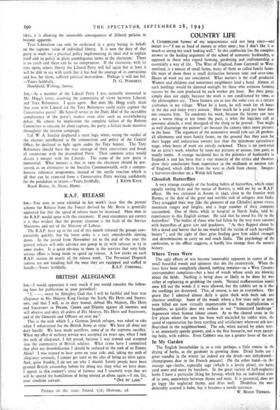COUNTRY LIFE
A CUMBERIAND farmer of my acquaintance said not long since—and meant it—" I am as fond of money as other Men ; but I don't like it as much as seeing my stock looking well." In this confession lies the complete answer to the leading argument of the school of economic husbandry, as opposed to those who regard farming, gardening and craftsmanship as essentially a way of life. The West of England, from Cornwall to West- morland, is a mosaic of small farms, many of them so called family farms. On most of them there is small distinction between time and over-time. Hours of work are not considered. What matters is the stuff produced. Women and children and sometimes neighbours lend a hand. Almost all such holdings would be damned outright by those who estimate farming success by the sum produced by each worker per hour. But their gauge simply does not apply, because the work is not conditioned by time, as the philosophers say. These farmers are in just the same case as a certain craftsman in my village. When he is keen, he will work for i6 hours in the day and enjoy every minute. How much he is paid per hour does not concern him. To condemn his work, because the factory can turn out a worse thing at ten times the pace, is what the logicians call an ignoratio elenchi, a total disregard of the thing to be proved. Yon might as well discourage the painter's art because the camera takes more•pictures to the hour. The argument of the economists would rule our all gardens, all allotments and most family farms, on the ground that they earn for their happy and industrious owners less than the' minimum agricultural wage, when hours of work are strictly reckoned. There is no yard-stick for an artist's work, whether he turns out pictures or onions, iron gates or woolly lambs. A strange incidental fact in the polemics of husbandry in England is and has been that a vast majority of the critics and theorists draw their conclusions from experience in. the midlands or eastern side of England, which differs from the west as chalk from cheese. Imagine a harvester-thresher on a Welsh hill farm]


























 Previous page
Previous page